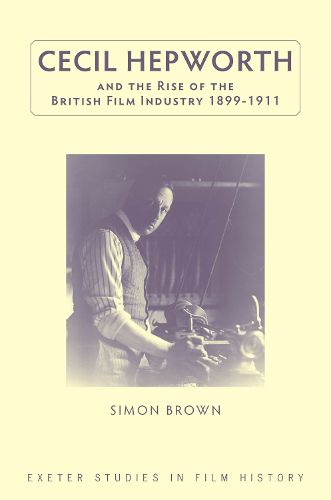Readings Newsletter
Become a Readings Member to make your shopping experience even easier.
Sign in or sign up for free!
You’re not far away from qualifying for FREE standard shipping within Australia
You’ve qualified for FREE standard shipping within Australia
The cart is loading…






This book offers an industrial, economic and aesthetic history of the early years of the British film industry from 1899-1911, through a case study of one of the most celebrated pioneer film makers, Cecil Hepworth.
Presenting a picture of daily life in his film studio, an analysis of Hepworth’s films is offered including the development of their content, production methods and marketing in this formative period.
The early twentieth century saw British film production develop from a cottage industry of artisans to a multi-modal complex economic system with a global reach. Changes in the nature of exhibition and distribution caused a major crisis in the years 1908-1911, whereby Britain lost its status as a world leader in film making. Existing histories of this period lay this crisis at the feet of pioneers like Hepworth, whose perceived inability to improve the quality of film production led to stagnation.
Brown attempts to challenge this assumption by analysing Hepworth’s development of production methods as well as his strategies towards sales in the market to demonstrate the impact on the modernisation of the film industry.
$9.00 standard shipping within Australia
FREE standard shipping within Australia for orders over $100.00
Express & International shipping calculated at checkout
This book offers an industrial, economic and aesthetic history of the early years of the British film industry from 1899-1911, through a case study of one of the most celebrated pioneer film makers, Cecil Hepworth.
Presenting a picture of daily life in his film studio, an analysis of Hepworth’s films is offered including the development of their content, production methods and marketing in this formative period.
The early twentieth century saw British film production develop from a cottage industry of artisans to a multi-modal complex economic system with a global reach. Changes in the nature of exhibition and distribution caused a major crisis in the years 1908-1911, whereby Britain lost its status as a world leader in film making. Existing histories of this period lay this crisis at the feet of pioneers like Hepworth, whose perceived inability to improve the quality of film production led to stagnation.
Brown attempts to challenge this assumption by analysing Hepworth’s development of production methods as well as his strategies towards sales in the market to demonstrate the impact on the modernisation of the film industry.